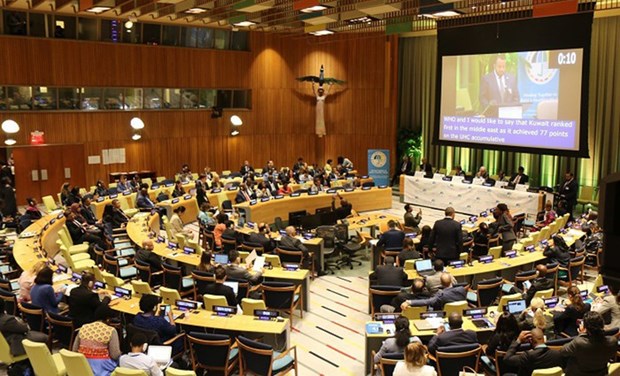 Vietnam works hard to reach universal health coverage by 2030. (Photo: hanoimoi.com.vn)
Vietnam works hard to reach universal health coverage by 2030. (Photo: hanoimoi.com.vn)
Hanoi (VNA) – Vietnam has recorded impressive
achievements in health care, and the country is working hard to fulfill the
target of universal health coverage (UHC) by 2030.
The Vietnamese Ministry of Health reported at a
high-level meeting on UHC of the United Nations General Assembly on September
23, 2019 that a primary healthcare system has been established from central to
grassroots levels in Vietnam with more than 11,000 commune health centres, most
of which have at least a doctor, a nurse and a midwife working based on the
model of family medical practices.
 At the high-level meeting on UHC of the United Nations General Assembly on September 23, 2019. (Photo: Ministry of Health)
At the high-level meeting on UHC of the United Nations General Assembly on September 23, 2019. (Photo: Ministry of Health)The “Tracking Universal Health Coverage: 2017 Global
Monitoring Report” jointly produced by the World Health Organisation (WHO) and
World Bank (WB) also showed that Vietnam scored 73 out of the 100 points in
service coverage delivery index, which was higher than Southeast Asia’s
average of 59 and the global average of 64.
About 90 percent of the Vietnamese population is
covered with health insurance and the government has subsidised fully the premiums
for disadvantaged groups and those in difficult circumstances, and 70 percent
of the premiums for the poor.
Being aware of the significance of primary health care,
Vietnam has enforced 10 reforms to enhance the effectiveness of its healthcare
system, particularly the competence of primary healthcare clinics to provide
better services for both ill and healthy people.
Vietnam would soon take the lead in UHC by building
a firm foundation based on primary health care, with the participation of both
public and private sectors.
The WB has also commended Vietnam’s efforts to reach
UHC by 2030, notably in increasing health insurance coverage, raising premium
subsidies for for the near-poor and those working in the
informal sector, and stepping up the communication work in this regard, among
others.
According to the Social Security (), as
of early 2021, the number of health insurance participants totaled 87.97
million, making up 90.05 percent of the country’s population./.
Source: VietnamPlus
